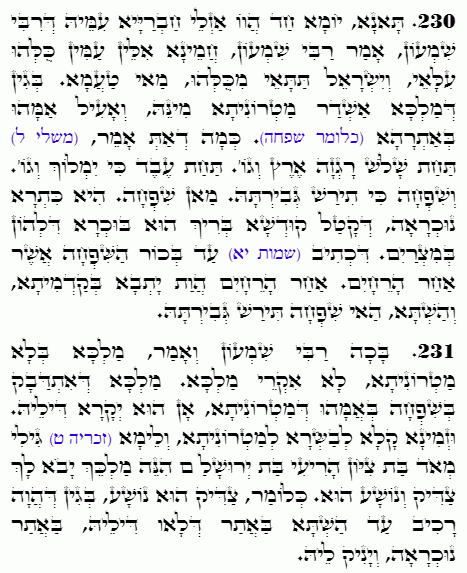Daily Zohar # 4652 – Acharei Mot – Why did Rabbi Shimon wept
Daily Zohar 4652

Hebrew translation:
231. בָּכָה רַבִּי שִׁמְעוֹן וְאָמַר, מֶלֶךְ בְּלִי גְבִירָה לֹא נִקְרָא מֶלֶךְ. מֶלֶךְ שֶׁנִּדְבָּק בַּשִּׁפְחָה, בָּאָמָה (שֶׁלָּהּ) שֶׁל הַגְּבִירָה, אֵיפֹה כְבוֹדוֹ? וְעָתִיד קוֹל לְבַשֵּׂר לַגְּבִירָה וְלוֹמַר: (זכריה ט) גִּילִי מְאֹד בַּת צִיּוֹן הָרִיעִי בַּת יְרוּשָׁלִַם הִנֵּה מַלְכֵּךְ יָבוֹא לָךְ צַדִּיק וְנוֹשָׁע הוּא. כְּלוֹמַר, צַדִּיק הוּא נוֹשָׁע, כִּי הָיָה רוֹכֵב עַד עַכְשָׁו בְּמָקוֹם שֶׁאֵינוֹ שֶׁלּוֹ, בִּמְקוֹם נָכְרִי, וּמֵינִיק אוֹתוֹ.
.
Zohar Acharei Mot
Continued from previous DZ
#230
We learned that one day, our friends were walking with Rabbi Shimon. Rabbi Shimon said, ‘I see that all the nations are elevated, and Israel is beneath them all. What is the reason? It is because the King sent away the Queen (the Shechina) from Him and brought in a maidservant in her place. As it is written,
Proverbs 30:21,22
“תַּחַת שָׁלוֹשׁ רָגְזָה אֶרֶץ וְתַחַת אַרְבַּע לֹא תוּכַל שְׂאֵת.”
“תַּחַת עֶבֶד כִּי יִמְלוֹךְ וְנָבָל כִּי יִשְׂבַּע לָחֶם.”
“For three things the earth is perturbed, Yes, for four it cannot bear up:”
“For a servant when he reigns, A fool when he is filled with food,”
Who is this maidservant? It is the Malchut of the other side (Sitra Achra), as the Holy One, blessed be He, killed their firstborn in Egypt, as it is written,
Exodus 11:5
“וּמֵת כָּל־בְּכוֹר בְּאֶרֶץ מִצְרַיִם מִבְּכוֹר פַּרְעֹה הַיֹּשֵׁב עַל־כִּסְאוֹ עַד בְּכוֹר הַשִּׁפְחָה אֲשֶׁר אַחַר הָרֵחָיִם וְכֹל בְּכוֹר בְּהֵמָה”
“and all the firstborn in the land of Egypt shall die, from the firstborn of Pharaoh who sits on his throne, even to the firstborn of the female servant who is behind the handmill, and all the firstborn of the animals.”
The maidservant (שִּׁפְחָה) sat behind the millstones initially, and now this maidservant has inherited her mistress. Instead of the holy Malchut (with the Shechina) receiving the blessing flow, this maidservant from the Sitra Achra takes all the flow and gives it to the nations who belong to her side.
Notes:
Rabbi Shimon and his students observe that Israel sees the lowly state of Israel. At the same time, the other nations, who are not connected to holiness, appear to be elevated (enjoying control in this world). Rabbi Shimon explains that this imbalance stems from a spiritual condition where the “King” has distanced the “Queen” and allowed a maidservant (the Sitra Achra) to take her place.
The maidservant who inherits her mistress has taken control (temporarily) of the flow of Light that was meant for the holy Shechinah in Malchut. This is the state of exile when the blessings from above flow to the nations under her domain instead of to the holy people of Israel.
#231
Rabbi Shimon wept, saying, “A king without a queen is not called a king. A king who becomes attached to a maidservant, the servant of the Queen, where is his honor? A voice will eventually proclaim to the Queen, saying,
Zechariah 9:9
“גִּילִי מְאֹד בַּת צִיּוֹן הָרִיעִי בַּת יְרוּשָׁלַ͏ִם הִנֵּה מַלְכֵּךְ יָבוֹא לָךְ צַדִּיק וְנוֹשָׁע הוּא עָנִי וְרֹכֵב עַל חֲמוֹר וְעַל עַיִר בֶּן אֲתֹנוֹת.”
“Rejoice greatly, O daughter of Zion! Shout, O daughter of Jerusalem! Behold, your King is coming to you; He is just and having salvation, Lowly and riding on a donkey, A colt, the foal of a donkey.”
That is to say, the righteous one, who is Yessod, is the one who is saved, for he had been riding until now in a place not his own, in a foreign place — that is, with the maidservant (שִּׁפְחָה) — and she nourished him. But now, the Queen has returned to him.
Notes:
Rabbi Shimon’s tears reflect the sorrow we all should feel during the spiritual exile, where the proper relationship between Hashem and the Shechina is disrupted. The Shechina is the appropriate vessel in Malchut to receive and distribute the flow of Light in the world.
In this state of exile, energy has been misdirected toward a maidservant (the Sitra Achra). This dishonors the King, for his proper place is with the Queen, not with a lower, impure force.
However, a voice of salvation is foretold, heralding the Queen’s return to her rightful place. This reunion brings joy and restores the original order as the union between the King and Queen is again established. Zecharia conveys a message of hope and restoration, addressing the “daughter of Zion” (Yessod of Malchut) and “daughter of Jerusalem” (Jerusalem and its people) as they await the arrival of their King.
Zechariah 9:9, “Lowly and riding on a donkey, a colt, the foal of a donkey,” reassures the people that their awaited King Mashiach will not be one of oppressive power but one who embodies righteousness, salvation, and peace. His humble entrance signals the nature of His reign, restoring harmony between Hashem and His people and bringing peace not through war but through spiritual transformation.
{||}

 Previous: Acharei Mot
Previous: Acharei Mot

